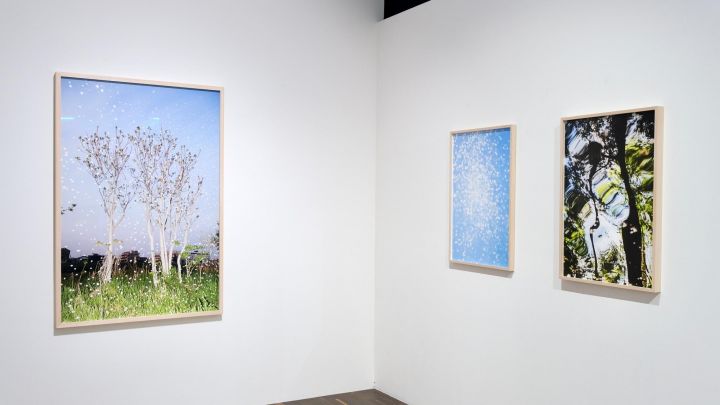Christophe Guye Galerie is thrilled to announce Yoshinori Mizutani's (*1987, Japan) third solo exhibition ‘Tokyo Whispers’ at the gallery. The exhibition shows 15 works from four different series – ‘Kawau’, ‘Sakura’, ‘Tokyo Parrots' and 'Yusurika' – and explores how the artist captures nature within the urban environment with his own distinctive photographic language. His photographs demonstrate an innate understanding of how forms, colours, textures and depth translate to the pictorial plane. He is working with a visual vocabulary that has been well established by the work of many contemporary photographers. Mizutani’s work serves as a good gauge of the visual tropes and photographic styles that are prevalent among young photographers in Japan.
Yoshinori Mizutani (*1987) lives and works in Tokyo. Mizutani graduated from the Tokyo College of Photography in 2012. He has won a number of prestigious awards including Japan Photo Award in 2013 as well as Foam Talent Call and Lens Culture Emerging Talents Top 50 in 2014. Since 2012 he has exhibited in many international institutions in Japan, China, Belgium, Great Britain, Italy, and Switzerland, and has published, among others, ‘Tokyo Parrots’, Colors’, ‘Yusurika’ and ‘Hanon’.
About the series KAWAU:
'I have a growing interest in birds inhabiting Tokyo since I completed my previous series 'Tokyo Parrots'. 'KAWAU', which is a Japanese term for cormorant, composes the second part of my trilogy on birds. Similar to the parakeets captured in 'Tokyo Parrots', kawau has increased dramatically in number over the past decade and now their over population is causing troubles to the human life as well as local ecosystem in several parts of the country. Despite their reported negative impact and reputation, it is breathtaking to watch a big flock of birds, and through my photography I want to reveal their existence, which makes our everyday urban landscape somehow surreal.' – Yoshinori Mizutani
About the series SAKURA:
'Cherry blossoms are so beautiful that I don't think I've spent as much time looking at anything else. Facing a Sakura tree, my eyes shift from one petal to another, from one flower to another until the whole picture is grasped. In 'Sakura', I attempt to visualize the move of my observing eyes and crystallize the visual experience of meditating and wandering upon the blooming tree. As a result, the images shows that photography captures not only a specific moment, but also the passing of time.' – Yoshinori Mizutani
About the series TOKYO PARROTS:
Mizutani was moved by and became obsessed with the unusual population growth of lime green parrots in Tokyo. His photographs capture the strange urban landscapes and uncanny feeling created by the parrots' presence.
On his encounter with the parrots Mizutani has commented: 'When I first saw them, I was afraid - I thought I was going to be attacked, like in Hitchcock's "The Birds". '
'The Tokyo Parrots are obvious in some ways. We would conceivably notice them ourselves were we to wander the particular streets of Tokyo they live near. But for sure we would not see them the way Yoshinori Mizutani makes us see and experience them. The photographer elevates what must be a strange spectacle in person, to bring us a different, equally strange, and compelling beautiful spectacle in the form of photographs.' – From Tokyo Parrots, an essay on Yoshinori by Jörg Colberg in FOAM Talent 2014.
About the series YUSURIKA:
'Yusurika' is the name of a tiny mosquito like insect in Japanese. Mizutani decided to base a series of photographs on this little bug because he constantly searches for nature within the urban environment where he lives. He believes this attraction to nature is related to his upbringing and the rural area where he was born.
'Observing the wildlife allows me to once again recognise and think about the attractions it offers. While playing in the nature, I am exploring and reflecting upon my own past. It is this linking of memory and the genuine affinity towards the wildlife that I wish to express through my work.' – Yoshinori Mizutani
Yusurika encompasses more than the little bug alone. It is Mizutani's poetic tribute to nature.
